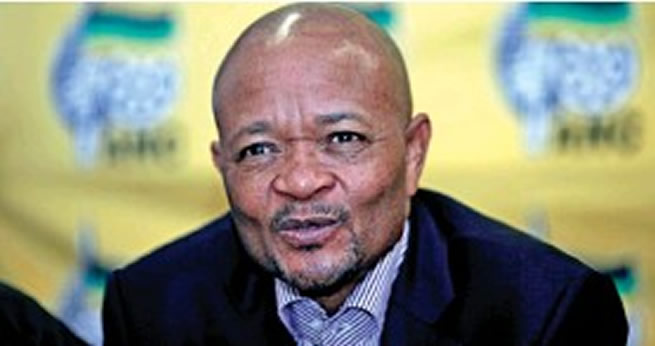Mchunu Defends Disbanding of Political Killings Task Team, Cites National Concerns
CAPE TOWN – Suspended Police Minister Senzo Mchunu yesterday defended his decision to disband the political killings task team (PKTT), telling parliament's ad hoc committee that it was necessary to optimise resources and address crime across South Africa, not just in one region. Mchunu, who is currently on special leave, stated that the ministry could not justify funding a unit that was primarily focused on political killings in KwaZulu-Natal (KZN) while other areas of the country were grappling with equally serious crime issues.
Mchunu's testimony comes amidst a series of suspensions within the security cluster, raising concerns about stability but also sparking debate about accountability.
Mchunu emphasised that his decision was not taken lightly. "I was not 'just itching' to disband the task team," he told the committee, "but that it had to be phased out because it was not dealing with the majority of victims of murder in SA." He argued that focusing solely on political killings, primarily affecting councillors and traditional leaders (amakhosi), ignored the broader crime landscape.
"Even if the team does well, it was not going to assist with the killings happening in the Cape Flats," Mchunu explained. "Every time there’s a death in the Cape Flats, you are asked, ‘what are you doing about it’? You can’t say ‘I have the political killings task team, which is operating in one corner’ and killings are happening also in other corners."
Mchunu referred to studies by the Global Initiative, which indicated that 35% of murders in South Africa were linked to organised crime, 34% to taxi violence, and 24% to political killings. "Now, when you allocate the resources, where do you put those figures?" he asked, underscoring the need for a more balanced approach to crime fighting. He said the disbandment of the PKTT was about optimisation of resources and complaints he received.
Beyond political killings, Mchunu also highlighted concerns about border management, citing the tragic murder of Amantle Samane, the seven-year-old Soweto girl who was raped and killed by an undocumented Mozambican national living in South Africa. "I felt embarrassed by that killing," he said. "Maybe if I had taken some orders to reduce inflow in the borders, we could have saved the life of the child." Mchunu said he became aware that the exit and entrance points in SA are porous, adding those who criticised the police were correct. "I identified that as a thing that I wanted to tackle," he said. He also spoke about freezing posts in crime intelligence, saying it was a decision he stood by.
Mchunu acknowledged that the PKTT had played a role in reducing political killings in KwaZulu-Natal, stating, "I am saying a factor, not that they single-handedly have brought down the killings in KwaZulu-Natal." He clarified that the disbandment of the team was discussed on November 1 and again on November 22, and that the task team was never intended to be permanent, even being referred to as a "project."
Mchunu refuted allegations made by KZN police commissioner Nhlanhla Mkhwanazi, who had suggested that Mchunu may not have authored the letter to disband the team. Mchunu insisted he was the author and invited committee members to examine his devices to verify this "before police take them."
Mchunu was placed on special leave following accusations by Mkhwanazi of interfering with police work. This suspension is part of a broader trend of high-profile suspensions within the security cluster. The same month, President Cyril Ramaphosa suspended Gauteng director of public prosecutions Adv Andrew Chauke pending an inquiry into his fitness to hold office. Two months later, police commissioner Gen Fannie Masemola suspended deputy commissioner for crime detection Lt-Gen Shadrack Sibiya after Mkhwanazi also accused him of the same thing as Mchunu. Then on Wednesday, Ramaphosa suspended inspector-general of intelligence Imtiaz Fazel, allegedly following a complaint about his conduct.
Minister in the presidency Khumbudzo Ntshavheni has assured the public that "the intelligence structures are fully operational, whether it’s crime intelligence, whether it’s state security, whether it’s defence intelligence," despite Fazel’s suspension.
Experts in crime and the legal field have offered differing perspectives on these suspensions. Independent crime and policing analyst Johan Burger said the suspensions show a political commitment to deal with the allegations of criminality within the criminal justice system, including the intelligence community. "The fact that some of the high-profile members of these organisations are now being acted against is something that one would expect to happen if we are serious about rooting out corruption and criminal involvement by senior state officials," he said.
Lawson Naidoo, executive secretary of the Council for the Advancement of the SA Constitution, emphasised the need for thorough and swift investigations. "I think the important point is that where there are allegations, they need to be properly investigated. They need to be investigated speedily, and they need to be resolved speedily, so that we can move on. People need to be removed, and they must be removed, but there must be a good cause for their removal," he said.
However, Unisa law expert Prof Dumisani Mabunda cautioned that the suspensions of top officials in the security cluster were threatening the stability of the country, though he added that there’s no need to panic "because we are not in a state of emergency."
In a final point, Mchunu stated that he had never spoken to Brown Mogotsi, a North West personality, around the time of the disbandment of the PKTT and would not know how Mogotsi obtained a copy of his letter. The ad hoc committee's investigation continues.

Follow Us on Twitter











